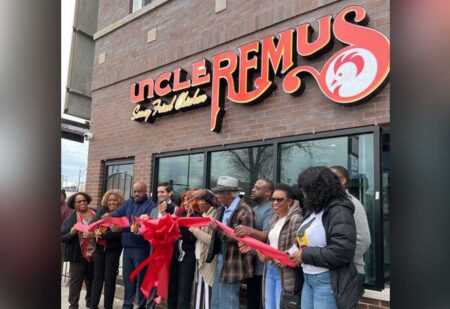Sisters Monica and Aidee San Miguel remember how their grandma used to carry a big loofah sponge on back-and-forth trips between Chicago and Mexico. Also called vegetable sponges, the long, fibrous beige cylinder would dangle off the sacks of her luggage. Sometimes black seeds would pop out of its cavities.
“I thought it was super weird when I was young. But now looking back, I realize it was a plant. It was compostable, and it grew in her garden. It’s local,” Monica told the Tribune.
Monica and Aidee said they never used phrases like “zero-waste” or “sustainability” growing up, but the sisters are honoring their Mexican heritage — and their abuela, whom they called “Mamapina” — with the business they’ve created by selling online sustainable household items and self-care products out of Monica’s home in Pilsen. Their store, VOLVERde, opened last August 2022.
As millions celebrate Earth Day this weekend, the sisters’ business represents an emerging trend of sustainable stores owned by people of color not only in Chicago, but in cities around the world, that embrace sustainable practices their families have practiced for generations.
Lucila Nejamkis, a professor at Arturo Jauretche National University in Argentina, works on the ground with women who engage in sustainable practices around cooking, safe water and conservation.
“The sustainability practices that migrants have practiced in their countries of origin — that are much more sustainable than city populations — are a very positive contribution to the contamination and pollution of big-city centers like Chicago and New York,” said Nejamkis, whose research focuses on gender, migration and climate change.
The sisters, who were raised in the south suburbs, said they wanted to offer an alternative to sustainable business models they’d seen elsewhere in the city.
“Does it include me? Does it include my experience? Is it talking to me? Our goal is to make that accessible and spin it, and say, ‘This is us. It’s always been us. It’s always been how we do things,’” Monica said.

The sisters often bought Mexican artisanal pieces on their travels. The business model started that way, they said — encountering woven brushes and tortilla-warming baskets, and then realizing how hard it is for many people in the United States to have access to them. They partner directly with artisans across Mexico and pay them upfront.
For Aidee, she said opening VOLVERde has allowed her to appreciate the amount of work that goes into traditional textile practices. She studied electrical engineering at University of Illinois Chicago, and quit her job at Sargent & Lundy to focus on starting their business.
“I didn’t realize all of the different elements these artists use for the natural dyes. There’s this insect that grows off of a nopal — a cactus. They are there grinding it. It makes this beautiful red, purple color,” she said.
She said even just carrying that knowledge makes her proud. It rubs off on their customers, and the e-commerce model allows them to sell their products to a wide range of communities beyond Chicago.
The sisters said they do occasionally sell their products at pop-up markets around the city. Their local sales efforts led them to Varela, owner of Semillas Plant Studio.
On Saturday, VOLVERde is teaming up with Angelica Varela, owner of Semillas Plant Studio at 1848 S. Blue Island Ave. in Pilsen., to host a community cleanup and pop-up sale from 10 a.m. to 4 p.m.
Varela has similar memories of her grandmother’s love of plants. She said she used to help plant chile and tomato seeds in her grandmother’s backyard.
Planting “semillas,” or seeds, is Varela’s business model. She’s built her store around the idea of planting seeds, spreading roots.
“Love grows here. Vendors come in — they’re planting their seeds in our space,” Varela said.

Semillas’ brick-and-mortar model is different from VOLVERde, but has the same goal — to bring sustainable models to communities that already practice zero-waste practices. Semillas is a community flower and plant shop that can be rented out for events. Varela said it’s a community gathering place.
“Families that have been in the neighborhood for so long have really shown their support,” Varela said. “They mention to me almost every time they come in that they feel so welcomed, and they feel like it’s a family meetup.”
Varela decided to open Semillas during the pandemic, after she was laid off from her hospitality job. At a time of uncertainty, she said, her plants were the only thing that made her happy. But she had to drive all around the city to get access to the plants she wanted.
“I realized: Why isn’t there anything like this? Latino-owned, in the area. In Pilsen,” she said. “Being around plants is our culture.”
In June 2020, she bought a store and her father built wooden shelves on the walls, which she covered with plants she had propagated and transplanted. Her whole family stepped up to help.
Varela also grew up on the South Side of Chicago, and said she moved a lot as a kid. From an early age, her mother instilled in her a no-waste mentality that has carried through to her business practices.
“We love to preserve our flowers. We have made an additional stream of revenue with dried flowers. It’s called a forever bouquet. You’ll have it forever,” said Varela.
Varela owns Semillas with her husband, Miguel Rivera, who said he is grateful to have a space to share with the Pilsen community. The couple balances the ups and downs of owning a new business while taking care of their 8-month-old baby.

He said Semillas tries to hire locally, to engage with the community. The majority of his family still lives in Puerto Rico.
Decades ago, Varela’s grandmother crossed the Rio Grande from Mexico to the United States with her eight children and bought a house in East Pilsen. She and her husband still live there.

Afternoon Briefing
Daily
Chicago Tribune editors’ top story picks, delivered to your inbox each afternoon.
Semillas and VOLVERde have found roots in Pilsen. The San Miguel sisters and Varela all have young children. Their siblings and parents live nearby and support them how and when they can.
Monica said that her dad even brags to his steel factory co-workers. “Steel factory men are not our target audience,” she said, laughing.
Both fledgling businesses are looking forward to experimentation in the coming months. Semillas is planning to open a coffee shop in the space, with coffee made from Puerto Rican grounds.
Aidee said she went back to Mexico in December, and her family was still saving food scraps to give to the next door neighbor’s pigs. As a child visiting, she remembers the water was collected in a small tank on the roof. She said they had to take quick showers because the same water supply was used to wash the dishes, bathe and do laundry.
She said it makes you mindful.
“Everything you do has a lot more connection to the environment. The land. The water. It’s all an extension of our gift from our ancestors,” she said. “As we moved here to the U.S., there is an irony. Having more opportunity, more economic freedom, we started losing that tradition.”







